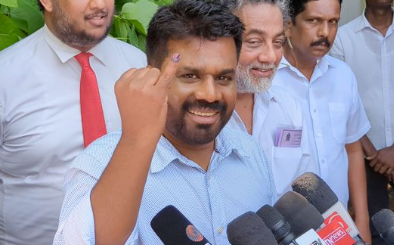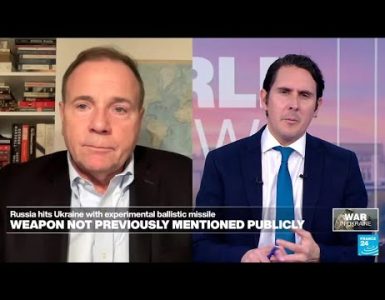The Marxists are taking over…
Sri Lanka finds itself at a turning point—where past and future hang together, where every vote carries the weight of a country’s hopes… its struggles. Two figures now stand in the spotlight, their names written into this crucial moment—Anura Kumara Dissanayake and Sajith Premadasa—each pulling the island in different directions, each vying for the right to lead in these uncertain times. This election? It was meant to deliver clarity, but instead, it has left the nation hanging, breath held, as no one secured the half of votes needed for an outright victory. Now, the story continues, with a second round of counting, preferential votes in play… and everyone watching, waiting.
Sri Lanka Set For First Marxist Head Of State?
Anura Kumara Dissanayake leads the way with 56% of postal votes from 7 electoral districts, his 2 opponents trail with 19% each.
Analysts have him taking over 50% of the vote for a historic win. (ToI) https://t.co/jryOq2rz2f pic.twitter.com/Ksu7QkIdXK
— RT_India (@RT_India_news) September 22, 2024
Dissanayake—a voice that rises from deep within the people’s struggles. His background, rooted in Marxist leanings, makes him a symbol of radical change—of something new. Then there’s Premadasa, walking a path trodden by legacy… a name that echoes through the corridors of power, the son of a fallen leader. Behind them both looms the shadow of Ranil Wickremesinghe, the incumbent who weathered the storm of 2022’s economic collapse but found his support slipping away, leaving him with just 17% of the vote. Dissanayake, with his 39.5%, takes the lead, but Premadasa isn’t far behind—he trails at 34%, close enough to make this anyone’s race.
And it’s not just an election—it’s a reckoning. The collapse of 2022 left its mark everywhere, tearing into the nation’s bones… empty shelves, fuel shortages, a currency stretched thin. People took to the streets, demanding change, and they got it when Gotabaya Rajapaksa fled, leaving Wickremesinghe to pick up the pieces. But even now, the cries for something new haven’t gone silent—they still ring out in the rallies, the speeches, the faces of those who remember the chaos. Dissanayake has become a lightning rod for those voices. At 55, he is the figure of defiance, promising to sweep away the old order and start again. Dissolve parliament within 45 days? That’s his vow—he’s offering a clean slate, a chance to reset, a campaign rooted in the backlash against the austerity tied to the $2.9 billion IMF bailout. Cut taxes, restructure the debt—ideas that shake investors but stir hope in the hearts of the working class.
Sri Lanka’s presidential election has delivered a humiliating defeat to @RW_SRILANKA and his former ally @sajithpremadasa . Congratulations to Sri Lanka’s first Marxist President @anuradisanayake who will be the new head of state and commander-in-chief. pic.twitter.com/iCig0QmHFH
— Ranga Sirilal (@rangaba) September 21, 2024
And yet, there’s Premadasa—57, calm, deliberate, a man who offers a middle path. His father’s tragic legacy shadows him still, but Premadasa stands on his own, offering promises of relief without the firebrand upheaval of Dissanayake. He talks of tweaking the IMF agreements, not tossing them aside… a more cautious approach, but one that’s drawn support from rural communities, especially farmers who feel the pinch of these hard years. He’s closed the gap steadily, rallying his forces, gaining momentum. In 2019, he came second to Rajapaksa with 42% of the vote, and now, once again, he is within reach of the presidency.
Whoever wins will inherit more than just a title—they will inherit a nation teetering on the edge of recovery and ruin. The path ahead? Steep and treacherous. The IMF’s program stretches until 2027, demanding a balancing act that would challenge any leader. Repay debts, calm the markets, bring in foreign investors… and yet, at the same time, lift millions out of the poverty that tightened its grip after 2022’s collapse. It’s a monumental task, a tightrope of promises and expectations.
As for the election day itself—it moved with calm certainty. About 75% of the 17 million eligible voters cast their ballots. The tension? It was there, humming just beneath the surface, as a brief curfew hung over the island while votes were counted. But the process, as far as elections go, was smooth. Yet now, all that remains is uncertainty.
Marxist leader #AnuraKumaraDissanayake wins Presidential Election, as Sri Lanka shifts from elite to working class@anuradisanayake tweets, “The dream we have nurtured for centuries is finally coming true. This achievement is not the result of any single person’s work, but the… pic.twitter.com/glwj0LsXXQ
— TIMES NOW (@TimesNow) September 22, 2024
And so, the people wait… Will Dissanayake’s bold push for transformation catch fire, carrying the nation into a new chapter? Or will Premadasa’s steady hand—grounded in reform and the past—prevail, leading with a more cautious, balanced approach? The final tally of votes will decide, but one thing is clear: the future of Sri Lanka stands on a knife’s edge, ready to tip either way.
Major Points:
- Sri Lanka’s presidential race heads to a run-off after neither Dissanayake nor Premadasa secured 50% of the vote.
- Dissanayake leads with 39.5%, promising radical change and a clean break from the past.
- Premadasa trails with 34%, offering a more moderate, reform-focused path grounded in legacy.
- The election follows the 2022 economic collapse, with Sri Lanka still recovering from deep poverty and financial turmoil.
- The next president must balance IMF demands with the nation’s need for relief and recovery.
RM Tomi – Reprinted with permission of Whatfinger News









Add comment